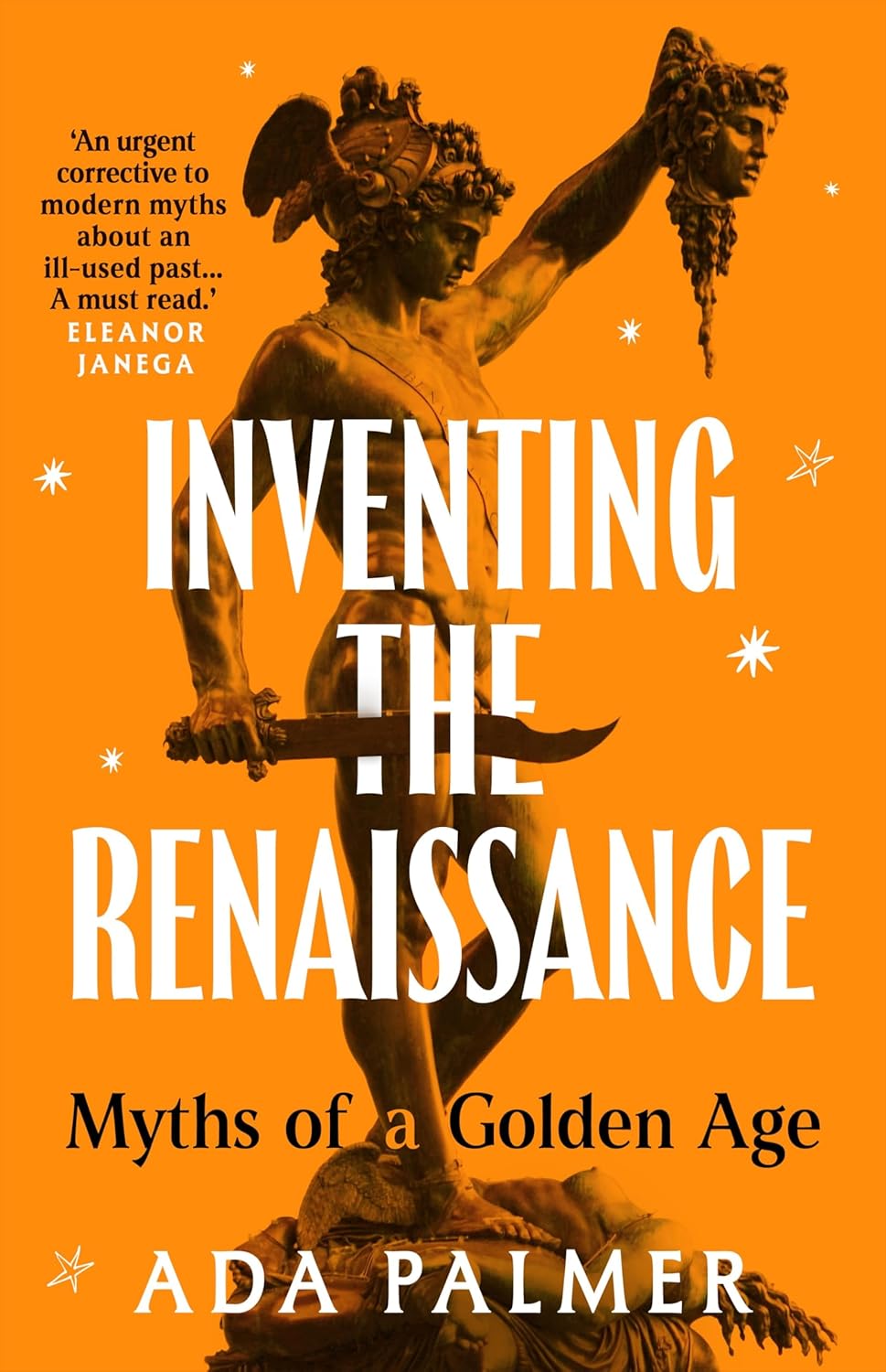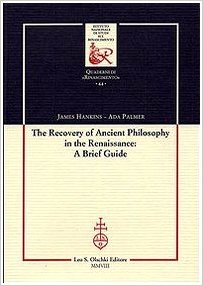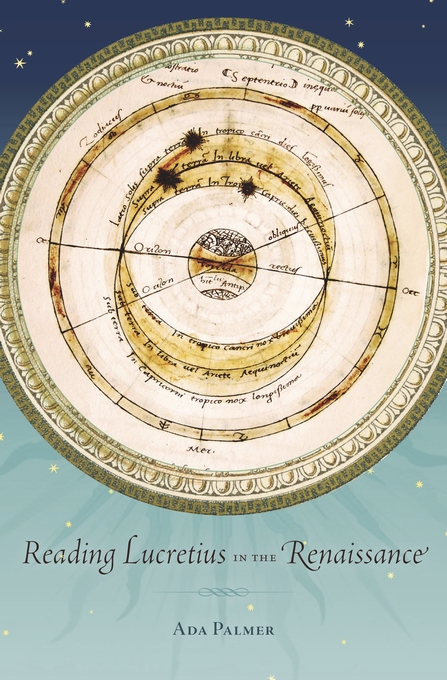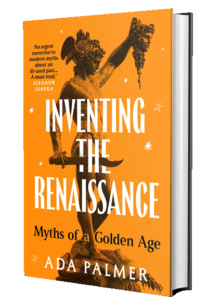Ada Palmer’s historical (non-fiction) publications include a variety of articles, chapters, and books.
Books
Inventing the Renaissance
If you’ve enjoyed my ExUrbe blog and history stories, the book is here at last!
In the UK (order from Bookshop.uk, Blackwell’s, Amazon, Kobo, Kindle e-book or Audiobook.) In the USA (order from Bookshop.org, Barnes & Noble, Amazon, or for Nook, Kobo, or Kindle e-book or Audiobook.) If you order directly from UCPress’s website you can get a 30% discount by using the coupon UCPNEW. Or it’s always best to order from your favorite independent bookshop!
In Inventing the Renaissance, acclaimed historian Ada Palmer provides a fresh perspective on what makes this epoch so captivating. Her witty and irreverent journey through the fantasies historians have constructed about the period show how its legend derives more from later centuries’ mythmaking than from the often-grim reality of the period itself. She examines its defining figures and movements: the enduring legacy of Niccolò Machiavelli, the rediscovery of the classics, the rise of the Medici and fall of the Borgias, the astonishing artistic achievements of Michelangelo, Leonardo, and Cellini, the impact of the Inquisition, and the expansion of secular Humanism. Drawing on her popular blogs and writing with her characteristic energy and wit, Palmer presents the Renaissance as we have never seen it before. Colloquial, funny and brilliant, this is a work of deep scholarship that will make you alternately laugh and cry.
The Recovery of Classical Philosophy in the Renaissance, a Brief Guide
Co-authored with James Hankins. Leo S. Olschki, 2008.
The Recovery of Ancient Philosophy in the Renaissance: A Brief Guide, by James Hankins and Ada Palmer, shows at what point the major texts and sources of ancient pagan pholosophy became available in Renaissance Europe, with entries organized by philosophical school. A vital reference for scholars of the recovery of ancient thought.
Reading Lucretius in the Renaissance
Harvard University Press, 2014.
In Reading Lucretius in the Renaissance, Ada Palmer explores how Renaissance readers, such as Machiavelli, Pomponio Leto, and Montaigne, actually ingested and disseminated the rediscovered Lucretius, and the ways in which the process of reading this brilliant but heretical ancient author transformed modern thought.
Featured Articles
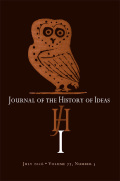
"Reading Lucretius in the Renaissance"
Journal of the History of Ideas, July 2012 v. 73 n. 3, 395-416.
This analysis of how Renaissance scholars explored the newly rediscovered text of Lucretius’ challenging epic poem De Rerum Natura shows how the evolution of humanist reading practices facilitated the poem’s distribution from 1417-1600. Recipient of the I Tatti Prize for Best Essay by a Junior Scholar in 2012, and the Selma V Forkosch prize for the best article published in the Journal of the History of Ideas in 2012.
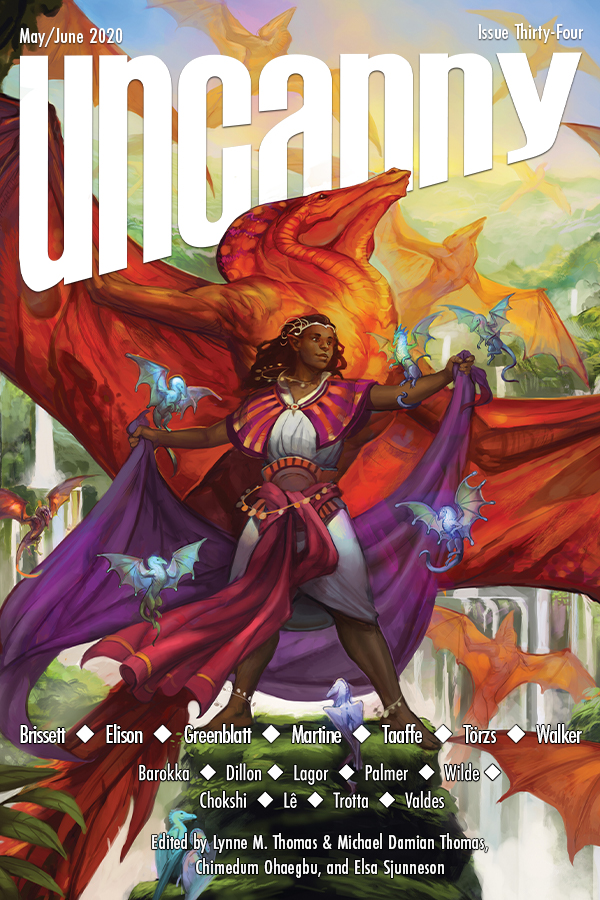
Censorship and Genre Fiction—Let’s Broaden our Broader Reality
Uncanny Magazine Issue 34
Changing the stories we tell is not a magic bullet that will defeat misinformation in the digital age, but I do think it can help. If we think carefully about our depictions of government, censorship, and silence, if we make a point of varying our stories, alternating villainous conspiracies with tales of honest whistleblowers, institutional goodwill, or community action, we can diminish the expectation that concealing the truth is a natural constant of government and good guy alike.
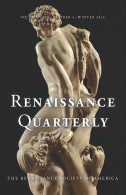
"Humanist Lives of Classical Philosophers and the Idea of Renaissance Secularization: Virtue, Rhetoric, and the Orthodox Sources of Unbelief"
Renaissance Quarterly, Volume 70, Issue 3 Fall 2017 , pp. 935-976.
This article contributes to the debate over the relationship between Renaissance humanism and later secularization and radical thought. By examining humanist biographies of ancient philosophers it demonstrates how pious humanists’ efforts to Christianize and defend pre-Christian thinkers fostered intellectual tools which inadvertently undermined the necessity of Scripture, paving the way for later Deism.
Other Recent Articles and Book Chapters
-
“Pomponio Leto’s Lucretius, the Quest for a Classical Technical Lexicon, and the Negative Space of Humanist Latin Knowledge,” Erudition and the Republic of Letters 8, no. 3 (August 2023):221-278.
-
“The Effects of Authorial Strategies for Transforming Antiquity on the Place of the Renaissance in the Current Philosophical Canon,” in Beyond Reception: Renaissance Humanism and the Transformation of Classical Antiquity, eds. Patrick Baker, Johannes Helmrath, and Craig Kallendorf, 2019.
-
“The Recovery of Stoicism in the Renaissance,” in The Routledge Handbook of the Stoic Tradition, ed. John Sellars. New York: Routledge, 2016.
-
“The Active and Monastic Life in Humanist Biographies of Pythagoras,” in Forms and Transfers of Pythagorean Knowledge: Askesis – Religion – Science, eds. Almut-Barbara Renger & Alessandro Stavru. Harrassowitz: Wiesbaden, 2016.
-
“T. Lucretius Carus, Addenda et Corrigenda,” in Catalogus Translationum et Commentariorum, vol. 10. Washington D.C.: Catholic University of America Press, 2014.
See Curriculum Vitae for a full publications list.

